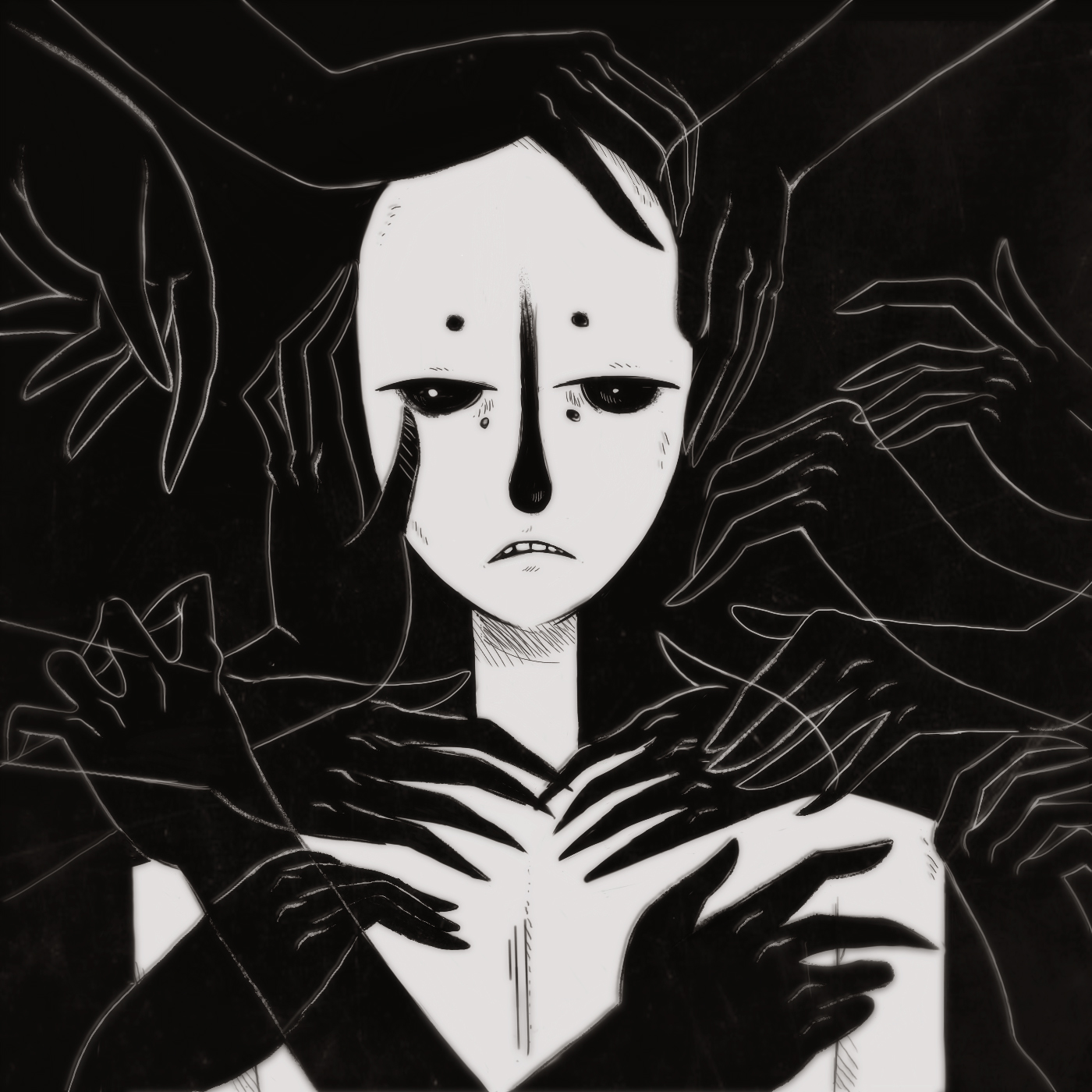Guest Album Review – “Kid A” by Radiohead
This guest review was originally part of a music blog project I created called Under The Deer. Since that site won’t be around forever, I’m archiving these wonderful reviews and their accompanying illustrations here. Writer and illustrator listed at end of the review.
Radiohead might be the best band since The Beatles. For sheer range of effect, lyrical subtly, sonic virtuosity, and philosophical weight, they have come to define (and redefine) the last twenty-three years in popular music—first with The Bends, a spacey pop-rock masterpiece that featured such classics as “Fake Plastic Trees,” “Just,” “My Iron Lung,” and “Street Spirit,” and then with their most popular—and, some would say, greatest—album, OK Computer, which cemented their reputation as innovative rock gods. “Karma Police” and “No Surprises” are beloved by fans and non-fans alike, and “Paranoid Android,” which was voted the Best Song of the Last 15 Years by NME, has become a concert staple, along with “Exit Music,” “Let Down,” and the ironically titled “Lucky.”
Since 2001, Radiohead has released five albums, among them Amnesiac, their most challenging, jazzy, and (arguably) disjointed album, featuring everyone’s favorite downer, “Pyramid Song,” the hypnotic “I Might Be Wrong,” and the album’s closing dirge, “Life in a Glass House.” Hail to the Thief, the band’s protest album, which was seen by many as a return to form—at least their 90s rock form—gave us their first radio-friendly single in years (“There, There”) as well as “2 + 2 = 5,” a ferocious head-banger, and undervalued gems like “Backdrifts” and “Wolf at the Door.”
In 2007, Radiohead released their most crowd-pleasing album to date: In Rainbows, a nearly flawless 43 minutes of foot-stompers (“Jigsaw Falling into Place,” “15 Step,” “Bodysnatchers”) and tender ballads (“House of Cards,” “Nude,” “All I Need”), not to mention the band’s best song (“Reckoner”) as well as their saddest (“Videotape”). Their much-anticipated follow-up, The King of Limbs, however, was more problematic. The first half contained badly mixed, oddly static tracks like “Bloom” and “Feral,” while the second half featured the warm and groovy “Lotus Flower,” the gorgeously sad “Codex” and “Give up the Ghost,” and the genuinely uplifting “Separator.”
2016’s A Moon Shaped Pool was a welcomed change of pace, combining the emotional intimacy of In Rainbows with a new string-heavy aesthetic—both acoustic and orchestral. Songs like “Burn the Witch,” “Identikit,” and “Ful Stop” reminded listeners that Radiohead still knew how to rock (albeit in new directions), and the delicate, swooning violins of “The Numbers” provided a classical counterpoint for the album’s piano-driven highlights: “Daydreaming,” a lush, sparkling search for lost time, and “True Love Waits,” the dark, melancholy twin of a live track recorded nearly fifteen years before.
Needless to say, any number of albums could be considered Radiohead’s “best”.
Most choose OK Computer, for obvious reasons, while many younger fans prefer In Rainbows’ warm accessibility to the harsh, cerebral satire of the 1997 game-changer. Meanwhile, jazz nerds love Amnesiac, classical buffs celebrate Radiohead’s latest effort, and political activists—railing against everything from pollution to corruption—tend to favor Hail to the Thief. Some even prefer the sometimes-soft-sometimes-hard-rock vibe of The Bends. No one, however—including Radiohead themselves—likes their debut, Pablo Honey, enough to rank it first (or even second or third—or, for that matter, fourth or fifth), and, despite its moments of brilliance, few would rank The King of Limbs much higher.
There is one album, however, which has so far gone unmentioned: Kid A. Rolling Stone ranked it the best album of the 2000s, as did Pitchfork, who gave it not one, but two elusive 10/10s—the first upon its initial release, the second after its recent reissue. The idea, in 1999, that Radiohead could not just match but transcend OK Computer seemed unlikely, akin to asking Pink Floyd to top Dark Side of the Moon, yet one year later that’s exactly what happened—and not by making OK Computer: Part Two. Instead, Yorke and his not-so-merry band of brothers traded their guitars for keyboards, tossed their non-rock-related influences—such as jazz, electronic, and classical—in a blender, and poured out a bizarre, unnerving puree of sonic experimentalism.

The opening track, “Everything in Its Right Place,” launches the listener into an otherworldly—yet strangely familiar—soundscape. “Everythiiiiinnnnng, everythiiiinnnggg,” Yorke croons, his gentle, nasal falsetto floating from syllable to syllable, caressing you into a kind of demonic trance. Right away, you sense a hint of irony in the title: everything is either not in its right place or in its right place, but in a bad way—a theory reinforced by the subsequent lines: “Yesterday, I woke up sucking a lemon…There are two colors in my head…What was that you tried to say, tried to sayyy, tried to sayyyyyyyy?” (A good question, which the song seems to ask itself.) Clearly, we’re not in Kansas anymore—or are we? Many of us, no doubt, feel upon awakening like we’re “sucking a lemon,” both literally and metaphorically: morning breath, morning ennui. Life leaves a sour taste in the mouth, especially when you’re tired and reluctant to meet it. The “two colors” in Yorke’s head seem to suggest anxiety—conflicting thoughts, self-defeating desires—or a kind of depression-inspired monotony: life in black and white, the world deprived of meaningful gradations. The final line, which both bludgeons you into submission and catapults you toward the sublime, connotes an inability to communicate and thus connect with other minds. Isolation, alienation, frustration—this song (and Kid A) in a nutshell.
The title track continues in a similar vein, this time with Robot Yorke taking over the vocals, followed by “The National Anthem,” which externalizes the themes of its predecessors, shifting the focus to “everyone around here,” who is “so near,” who has “got fear,” and who is “holding on.” The thudding baseline and crashing cymbals suggest a more traditional rock song but don’t be fooled: two and a half minutes in, the track becomes an extended jazz freak-out, inspired by the more chaotic side of Charlie Mingus. The next tune, “How to Disappear Completely (And Never Be Found),” pulls a sonic U-turn, trading everything electric for their acoustic counterparts—not to mention slowing the tempo, softening the tone, and filling out the folk-infused texture with wailing organs and heavenly vocals. The lyrics are as plain and authentically painful as the title suggests (“That there, that’s not me…I’m not here…This isn’t happening”), and during the cathartic crescendo the sadness—as well as the volume—gets turned up to eleven.
“Treefingers,” on the other hand, barely moves. More tone poem than song, it provides an ambient respite from the emotional swings and existential roundabouts of everything that came before. Tonally, it returns to the icy, tranquil terrain of “Kid A,” lulling you to sleep before shaking you awake with “Optimistic,” the most (ironically?) upbeat track on the album. Although the lyrics are mostly sardonic, the refrain has the trappings of sincerity: “You can try the best you can…The best you can is good enough,” which is then undercut by “I’d really like to help you, man”—the prelude to a flimsy excuse. Vague enough to imply everything, Yorke could be singing about the state of the world or the state of your soul, and, in this case, the ambiguity is reassuring. One senses light breaking through the Kid A clouds.
That is, until “In Limbo” starts, and you’re thrust back into hell. No song so aptly embodies the sensation of mental instability. The awkward, atonal structure, the cacophonous chords and mismatched layers of instrumentation—everything underscores the sensation of “living in a fantasy life,” if by “fantasy” Yorke means delusions and nightmares. Internal Hell then gives way to External Hell, as we abandon Yorke’s psychological limbo for the bleak and bare terrain of “Idioteque.” One of Radiohead’s few dance-inducing tracks, this visionary gem is equal parts catchy and jarring, hypnotic and disturbing. The lyrics, comprised of apocalyptic sound-bites (“Ice age coming…Who’s in the bunker?…Women and children first”), overshadow a soul-crushing beat and spine-tingling tones, sampled from the early days of electronic music. The ethos of the age is also evoked in phrases like “take the money and run,” “I haven’t seen enough,” and “I laugh until my head comes off.” The most haunting line, however, is the most apparently harmless: “Here, I’m allowed everything all of the time.” Our permissive culture—ecologically, economically—has created a world of self-obsessed, hedonistic anti-citizens (an “Idioteque,” if you will) hell-bent on bending things until they break. A century-defining song, “Idioteque” encapsulates our current predicament—as well as its inevitable outcome—more effectively (and more succinctly) than any dystopian novel or political text.
The penultimate track, which starts where “Idioteque” left off, is appropriately titled “Morning Bell.” The opening lyrics, “Morninnnn belllll, morninnnn bellllll,” sound like a nasal alarm clock designed to pull you out of a nightmare and thrust you into a waking one. Yorke’s repeated request to be “released” adds another layer of irony: released into the world or simply another dream—or an idealized combination of the two? The answer is unclear, but the album’s final song, “Motion Picture Soundtrack,” provides some ominous clues. From talk of “sleeping pills” and “cheap sex” to a longing for someone’s arms, it’s clear that this harp-filled lullaby isn’t meant to comfort. “I think you’re crazy, maybe” sums up the album as a whole: Kid A is surely the product of a troubled, perceptive mind with bleak ideas about the world and where it’s heading, but if Yorke and Co. sound “crazy,” it says more about the listener than the band—hence the qualifier “maybe.” At the end, Yorke sings, “I will see you in the next liiiiiiiiife,” and floats into the ether. Whether this signals a kind of death or the desired release of “Morning Bell,” it comes as a relief for the listener, who feels for the first time in 48 minutes that everything is finally in its right place.
Which begs the question: why listen to (let alone like) this dark and difficult album? Why is it considered by so many critics and fans to be the height of Radiohead’s achievement? Surely OK Computer is more accessible, In Rainbows more rewarding. Surely an album with three songs of questionable quality—“Kid A,” “Treefingers,” and “In Limbo”—can’t be considered a flawless opus. (“Treefingers” overstays its welcome, “Kid A” weirds itself out, and “In Limbo” does both.) Each is an integral part of the Kid A experience, but few Radio-Heads seek them out beyond the context of the album.
That said, Kid A flows seamlessly from song to song, idea to idea, emotion to emotion. It is unified and coherent, expansive and internal, visionary and down-to-earth. One could mention its pervasive influence, its blend of psychological insight and musical sophistication, or simply its jaw-dropping prescience, but the reason this album remains so revered is simple: it’s great in the way that Sgt. Pepper or Revolver is great. It lets you know you’re not alone; it shines some light (however dim) in the darkness. For ten tracks, Thom Yorke becomes a poet, a prophet, a political activist, a ghost, a robot, and a manic-depressive—in short, he becomes a person, a disenchanted, discombobulated citizen of the 21st century.
Contributors

Chris Gilmore is the author of Nobodies. His writing has appeared in McSweeney’s, Hobart, The New Quarterly, Matrix, and The Puritan. In 2017, he won the U of T Magazine Short Story Contest.

Rekka Bellum is an illustrator who lives, travels and works aboard a sailboat. Common illustration themes include fungi, root vegetables, skeletons and sad animal people.